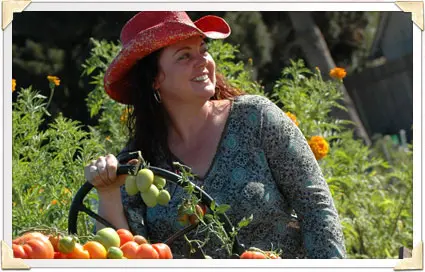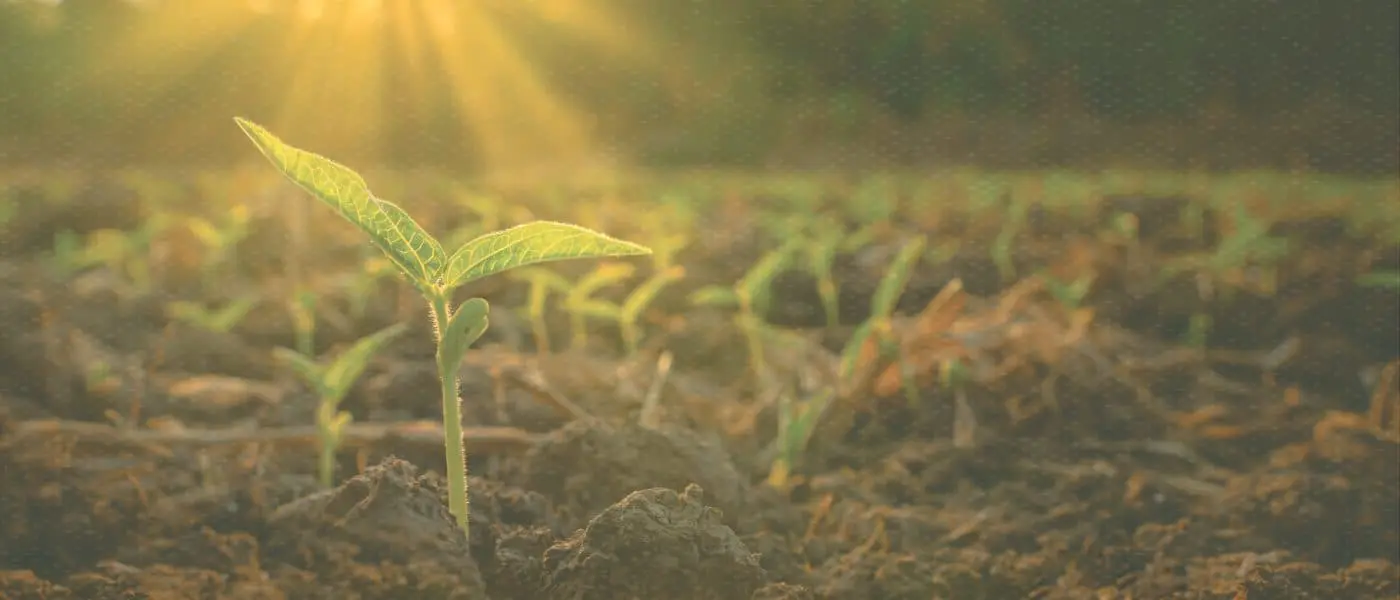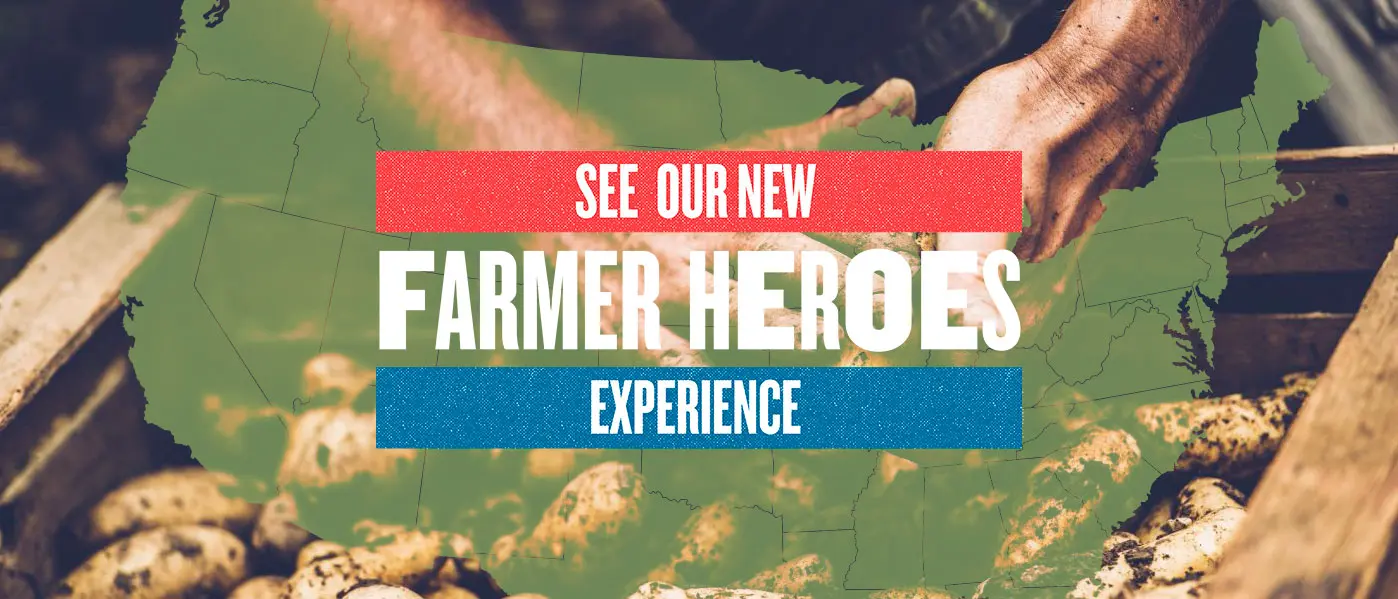Carmel & Carmel Valley, Ca
Farmer Jamie Collins came to us through our funded group, Community Alliance with Family Farmers (CAFF) in Davis, CA. CAFF’s mission is to build a movement of urban and rural people to foster family-scale agriculture that cares for the land, sustains local economies and promotes social justice. One of their programs links farmers with schools that are interested in serving local products and helping their students learn about family farm agriculture.
How did you start farming?
I graduated from Cal Poly San Luis Obispo for Crop & Fruit Science in 2000. My previous education and job experience included social work and interior design. Believe it or not, having experience in both of those really helped me in farming.
After five years I was burned out on social work and found I enjoyed working with plants. I chose the Crop Science major because I figured if I was going to grow something, it should feed people. Once I was out of college I started working as the assistant farm manager for what is now a large corporate organic farm. A year later I started farming four acres in Moss Landing while working two jobs to support what I call my ‘farming hobby.’ I grew sunflowers, beets, green beans and lots of weeds the first season.
The following year I took on a farming partner, Roberto Garcia, a friend and coworker from my previous farming job. Roberto has been farming since he was nine years old when he left Oaxaca to pick cotton in Chiapas, Mexico. Our combined strengths were magical. We eventually developed strong markets for our crops and located additional acreage in Carmel Valley, where it is warm enough to grow tomatoes. That is when we found our niche with heirloom tomatoes.
Now we grow over 100 varieties of vegetables, herbs and flowers on 30 acres. This past year we bought a small herd of Nubian goats we will begin milking in June, and we also have 50 rare and domestic hens and eight beautiful roosters. We sell our fertile, free-range eggs through our CSA and soon we’ll sell them at our farm stand opening in late spring. We have found that diversity is the key to success in farming! It also takes more effort to manage, but if you lose one crop, at least you don’t lose it all.
How has farming changed since you started?
Organic has become mainstream and large corporations have created their own organic lines. It is great that organics have become a choice in the mainstream market, however there is another level of consciousness that needs to be understood. Know your local farmer and try not to support produce that is shipped long distances, even if it is organic. Take it to a higher moral level and vote with your money. To me that means supporting small, local growers and reducing our dependency on petroleum products and decreasing our emissions.
Does your family help out on the farm?
My family is down in southern California so they don’t get a chance to help out much. When my uncle visits from So Cal, he likes to take the tractor out for a spin and disc our fields for fun. We have to keep telling him to slow down because if you pull a disc too fast it doesn’t chop up the crop residue very well. Lots of friends have spent their time helping over the years. In the beginning, everyone was offering their free time to help out at the farm, and who knows where we would be if they hadn’t. Those are some of my best memories. Sometimes all you need is a little moral support when something appears overwhelming.
Describe an average day on your farm.
Every day is different on the farm, which is why I love farming so much. It really depends if we are in harvest mode and what day of the week it is. Starting in spring, each week we harvest for two to three farmers markets, our Community Supported Agriculture (CSA) boxes, for wholesale orders and our local restaurant route.
In the winter we are in clean up mode, and in spring we spend most of our time raising transplants in the greenhouse, planting in the field and fertilizing. In summer we harvest five or six days a week, especially when our heirloom tomatoes begin to ripen until the first hard frost.
What is the best thing about being a farmer?
Overall, the best things about being a farmer are the challenges and the chances for creativity. I love big work days where everyone works together, whether it be planting an obscene amount of potatoes or building a fence. It feels good to work as a team and to be exhausted and dirty at the end of the day.
I also love hanging out with the chefs and sampling the dishes they create from our food– chefs are rock stars to farmers! Walking the fields at sunset when everything is quiet is another thing that feeds my soul. It is at this time I check how the crops are progressing. Being able to harvest your own fresh, organic bounty is such a luxury.
Do you participate in a Farm to Cafeteria or Farm to Institution Program? If so, tell us how you got started, what you grow and how it benefits your farm.
We are in close connection with The Monterey County Farm to School Partnership. We are working on creating a learning center for children where kids can come for tours and hands-on instruction. We sell our vegetables and fruit to The International School of Monterey for their school lunch program. We give them a great deal on vegetables that we did not sell at the farmers market the day before. This helps the school keep their costs down and feed the kids organic produce, and it helps us find a home for our produce we did not sell.
We hope to work with other schools in the future as school lunch programs become more flexible and are able to accommodate local growers. It is so important for kids to eat great tasting, organic produce. A lot of what they get has no flavor, so it is no wonder that they think they don’t like vegetables! It is also very important for kids to understand where their food comes from and to teach them how plants grow.
Do you have a favorite chore?
Feeding the chickens and sitting with the goats while they eat, listening to them chew. Both are meditative.
Do you have a favorite farm animal/vegetable?
Tomatoes are my favorite vegetable (though it is botanically a fruit). Chickens are my favorite farm animal because they are so rewarding and entertaining. Chickens are pretty amazing creatures; they are great natural tillers, they keep bugs & slugs under control and they give us delicious eggs. They also come in so many varieties. I especially like the Bantam Frizzle – it looks like a stuffed teddy bear that went through the wash too many times.
How can people buy food from you or that you have grown or raised?
We have a CSA subscription program March through November for those who live on the Monterey Peninsula. We sell at three farmers markets – Monterey, Temescal (near Berkeley), and Palo Alto (South San Francisco Bay). We are opening a farm stand in spring of 2008 in Carmel on Highway One, and we also have a seasonal heirloom tomato U-Pick in Carmel Valley. We ship wholesale, so if there is interest in our product we can find a way to ship it since we are in the hub of transportation being so close to Salinas, AKA The Salad Bowl. We can be reached at
(831) 484-2729, or Serendipityorganics@yahoo.com
Is there anything else that you would like to share as a farmer or about your farm?
We will begin creating a Historical Interpretive Center, Community Garden, Demonstration Farm and Farm Stand this year on the coast of Hwy 1, just south of Carmel around the Carmel Lagoon. We are trying to raise funds to repair the historical barn and structures on the property and turn this California State Parks land into a sustainable working farm and food learning center, complete with classes and tours for all ages.
Date: 1/23/2008



